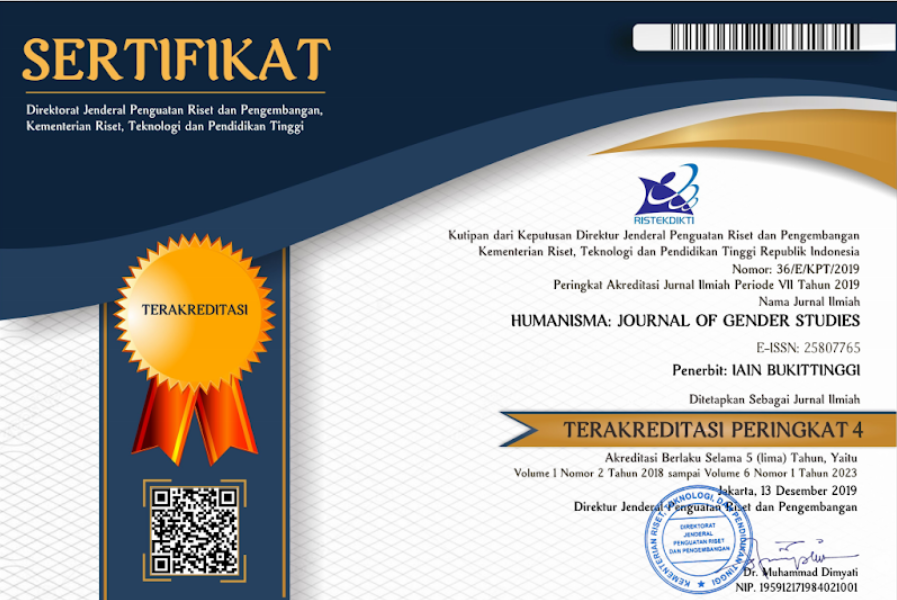FEMINISME : ANTARA OTORITER DAN OTORITATIF
DOI:
https://doi.org/10.30983/jh.v2i2.823Abstract
This paper is a philosophical description of women's knowledge. Does gender affect the way and what knowledge will be obtained by someone. If we follow the thesis of historical materialism of Marxism, then the answer is "yes," because a person's position in the relations of production determines the way he knows, and what content he will acquire, and women, in patriarchal society, the disadvantaged position. Then, whether to provide a critical assessment of the way and content of gender-affected knowledge requires a certain universal rationality assessment criterion. If so, how to make that rationality no longer a new force of oppressors, as claimed by postmodern thinkers. Feminism, as a philosophical movement and reflection, must use certain universal rationality and criteria of judgment without falling on totalitarianism on the one hand, or relativism on the other. Feminism must be authoritative without being authoritarianReferences
Hillary Putnam, “Why Reason Can’t Be Naturalized?†dalam Kenneth Baynes, Thomas McCarthy, dan James Bohman (ed), End Of Philosophy: End or Transformation?, Cambridge, MIT Press, 1987.
Jean-Francois Lyotard, The Postmodern Condition. A Report on Knowledge, Manchester, Manchester University Press, 1984.
Jürgen Habermas, Postmetaphysical Thinking. Philosophical Essays, Cambridge, MIT Press, 1992.
Jürgen Habermas, The Philosophical Discourse of Modernity, Cambridge, Polity Press, 1985,
Linda Alcoff dan Elizabeth Potters (ed), Feminist Epistemologies, London, Routledge, 1993.
Linda J. Nicholson, Feminism/Postmodernism, London, Routledge, 1990.
Lorraine Code, Rhetorical Spaces: Essay on Gendered Locations, London, Routledge, 1995.
M. Foucault, Power/Knowledge: Selected Interviews & Other Writings, 1972-1977, London, Harvester, 1980.
M. Foucault, The History of Sexuality vol. 1: An Introduction, London, Pelican Books, 1981.
Onora O’Neil, ‘Vindicating Reason’, dalam Paul Guyer (ed), The Cambridge Companion to Kant, Cambridge, Cambridge University Press, 1992,
Richard Rorty, Contingency, Irony, and Solidarity, Cambridge, Cambridge University Press, 1989.
Richard Rorty, Philosophy and The Mirror of Nature, Oxford, Blackwell, 1980.
Rita Selski, The Gender of Modernity, Cambridge, Harvard University Press, 1995.
Robert Wardy, The Birth of Rhetoric: Gorgias, Plato, and Their Succesors, London, Routledge, 1996.
Sabina Lovibond, “Feminism and Postmodernismâ€, New Left Review 178, 1989.
Sabina Lovibond, “The End of Moralityâ€, dalam Kathleen Lennon dan Margaret Whitford (ed), Knowing the Difference: Feminist Perspective in Epistemology, London, Routledge, 1994.
Seyla Benhabib, Feminist Conditions: A Philosophical Exchange, London, Routledge, 1995.
Thomas Nagel, The Last Word, Oxford, Oxford University Press, 1997.
W.V.O. Quine, Ontological Relativity and Other Essays, New York, Columbia Press, 1969.
Downloads
Submitted
Published
Issue
Section
License
Authors who publish with this journal agree to the following terms:
- Authors retain copyright and grant the journal right of first publication with the work simultaneously licensed under a Creative Commons Attribution-ShareAlike 4.0. that allows others to share the work with an acknowledgment of the work's authorship and initial publication in this journal.
- Authors are able to enter into separate, additional contractual arrangements for the non-exclusive distribution of the journal's published version of the work (e.g., post it to an institutional repository or publish it in a book), with an acknowledgment of its initial publication in this journal.
- Authors are permitted and encouraged to post their work online (e.g., in institutional repositories or on their website) prior to and during the submission process, as it can lead to productive exchanges, as well as earlier and greater citation of published work (See The Effect of Open Access).



















